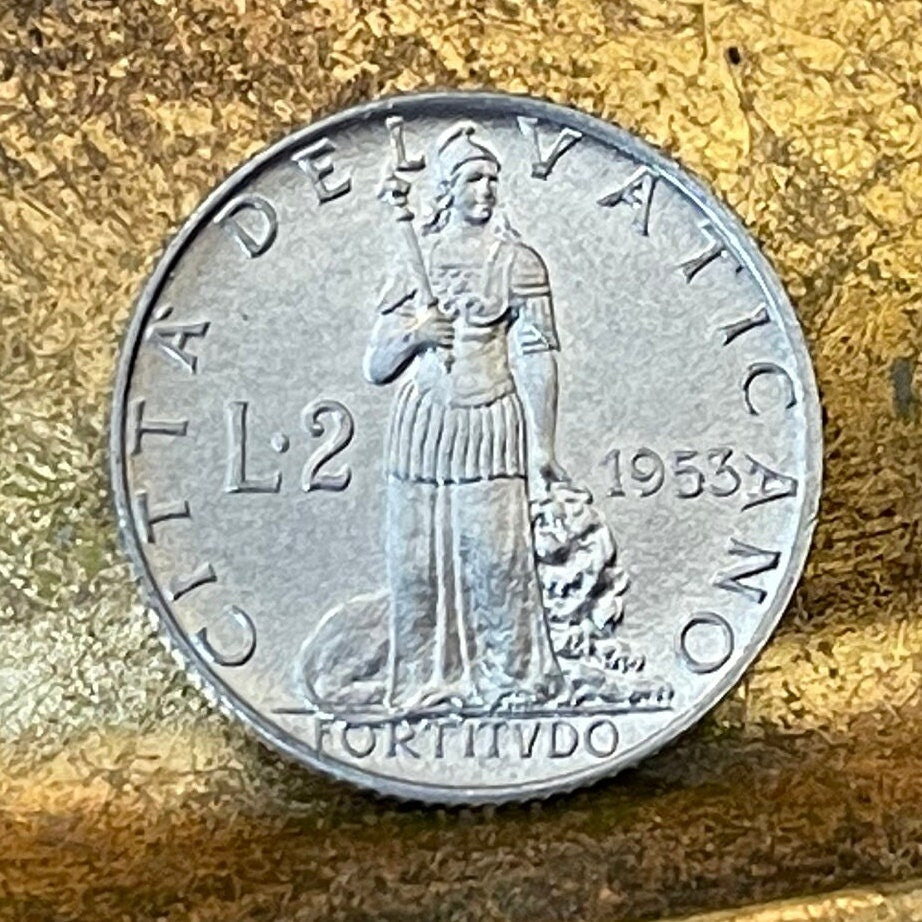elemintalshop
Cardinal Virtue Fortitude 2 Lire Vatican City Authentic Coin Money for Jewelry and Craft Making (Pope Pius XII)
Cardinal Virtue Fortitude 2 Lire Vatican City Authentic Coin Money for Jewelry and Craft Making (Pope Pius XII)
Couldn't load pickup availability
Cardinal Virtue Fortitude 2 Lire Vatican City Authentic Coin Money for Jewelry and Craft Making (Pope Pius XII) (Fortitudo) (Brave Lion)
Reverse: Fortitude standing, with lion (symbolizing Bravery) at her feet
Lettering: CITTA' DEL VATICANO
L·2
FORTITVDO
Obverse: Crowned arms, divided date below
Lettering: PIVS·XII·PONT·MAX·ANNO·XV
Features
Issuer Vatican City
Pope Pius XII (1939-1958)
Type Standard circulation coin
Years 1951-1958
Value 2 Lire (2 VAL)
Currency Lira (1929-2001)
Composition Aluminium
Weight 0.8 g
Diameter 18 mm
Thickness 1.54 mm
Shape Round
Orientation Coin alignment ↑↓
Demonetized 02-28-2002
Number N# 9198
References KM# 50
Wikipedia:
Cardinal virtues are four virtues of mind and character in both classical philosophy and Christian theology. They are Prudence, Justice, Fortitude, Temperance. They form a virtue theory of ethics. The term cardinal comes from the Latin cardo (hinge); virtues are so called because they are regarded as the basic virtues required for a virtuous life.
These principles derive initially from Plato in Republic Book IV, 426–435 (see also Protagoras 330b, which also includes piety (hosiotes)). They were also recognized by the Stoics. Cicero expanded on them, and Ambrose, Augustine of Hippo, and Thomas Aquinas adapted them while expanding on the theological virtues.
*****
Wikipedia:
Courage (also called bravery or valour) is the choice and willingness to confront agony, pain, danger, uncertainty, or intimidation. Valour is courage or bravery, especially in battle. Physical courage is bravery in the face of physical pain, hardship, even death or threat of death, while moral courage is the ability to act rightly in the face of popular opposition, shame, scandal, discouragement, or personal loss.
The classical virtue of fortitude (andreia, fortitudo) is also translated "courage", but includes the aspects of perseverance and patience. In the Western tradition, notable thoughts on courage have come from philosophers Socrates, Plato, Aristotle, Aquinas, and Kierkegaard, as well as Christian beliefs and texts.
Fortitude
Fortitude and Courage are distinguishable in that fortitude is the mental or emotional strength that enables courage in the face of adversity. According to Presbyterian theologian William Swan Plumer, "There is also, in strict propriety of language, a difference between courage and fortitude. Courage faces and resists danger; fortitude endures pain.... Courage is for action; fortitude for suffering. In this sense, fortitude differs little from constancy and patient endurance."
Aquinas says that fortitude ranks third after prudence and justice among the cardinal virtues. He distinguishes fortitude from fearlessness, which can too easily become recklessness through short-sighted audacity with disastrous results. In both Catholicism and Anglicanism, fortitude is also one of the seven gifts of the Holy Spirit.
******
Wikipedia:
Pope Pius XII (Italian: Pio XII), born Eugenio Maria Giuseppe Giovanni Pacelli (Italian pronunciation: [euˈdʒɛːnjo maˈriːa dʒuˈzɛppe dʒoˈvanni paˈtʃɛlli]; 2 March 1876 – 9 October 1958), was head of the Catholic Church and sovereign of the Vatican City State from 2 March 1939 until his death in 1958. Before his election to the papacy, he served as secretary of the Department of Extraordinary Ecclesiastical Affairs, papal nuncio to Germany, and Cardinal Secretary of State, in which capacity he worked to conclude treaties with European and Latin American nations, such as the Reichskonkordat with Nazi Germany.
While the Vatican was officially neutral during World War II, the Reichskonkordat and his leadership of the Catholic Church during the war remain the subject of controversy—including allegations of public silence and inaction about the fate of the Jews. Pius employed diplomacy to aid the victims of the Nazis during the war and, through directing the Church to provide discreet aid to Jews and others, saved hundreds of thousands of lives. Pius maintained links to the German Resistance, and shared intelligence with the Allies. His strongest public condemnation of genocide was, however, considered inadequate by the Allied Powers, while the Nazis viewed him as an Allied sympathizer who had dishonoured his policy of Vatican neutrality. After the war, he advocated peace and reconciliation, including lenient policies towards former Axis and Axis-satellite nations.
During his papacy, the Church issued the Decree against Communism, declaring that Catholics who profess Communist doctrine are to be excommunicated as apostates from the Christian faith. The Church experienced severe persecution and mass deportations of Catholic clergy in the Eastern Bloc. He explicitly invoked ex cathedra papal infallibility with the dogma of the Assumption of Mary in his Apostolic constitution Munificentissimus Deus. His magisterium includes almost 1,000 addresses and radio broadcasts. His forty-one encyclicals include Mystici corporis, the Church as the Body of Christ; Mediator Dei on liturgy reform; and Humani generis, in which he instructed theologians to adhere to episcopal teaching and allowed that the human body might have evolved from earlier forms. He eliminated the Italian majority in the College of Cardinals in 1946.
After he died in 1958, Pope Pius XII was succeeded by John XXIII. In the process toward sainthood, his cause for canonization was opened on 18 November 1965 by Paul VI during the final session of the Second Vatican Council. He was made a Servant of God by John Paul II in 1990 and Benedict XVI declared Pius XII Venerable on 19 December 2009.
Share



















